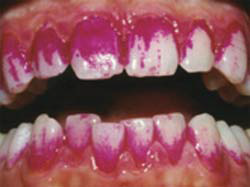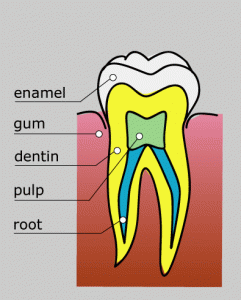Understanding the reason for tooth decay and the importance of visiting your dentist regularly is not always evident to most people. You may assume that because you have not experienced any physical pain or see any damage that you teeth are perfectly healthy. What you may not know is that the damage may go un-noticed for a long time and we at Glasgow Dental Centre have written this short and informative guide to help you understand the process of tooth decay
Your tooth is made of three main parts.
- The outer layer called the enamel
- The middle layer called the dentin
- The innermost pulp and root which contains the blood supply and the nerve
Science fact: The hard outer layer of your tooth called the enamel and is the hardest substance in your body – even harder than your bones! Tooth enamel is composed of various types of apatite crystals which in turn is made up from 90% calcium and phosphate. The addition of other materials such as fluride from your toothpaste change the apatites ability to withstand acid.
Everyday demineralisation of the teeth occurs as a result of eating acidic food. This is literally the acid in your mouth slowly dissolving your teeth – because your teeth are already so strong this process may even take years before you feel any pain.
When you brush your teeth you can use fluride based toothpaste which will kill the bacteria inside your mouth. Fluride is poisonous and can be harmful to you if swallowed so always ensure that you spit it back out and never swallow. Demineralised or damaged enamel becomes more susceptable to the bacteria in the mouth.
What is plaque?
Plaque is a sticky film of food and bacteria which forms constantly on your teeth. The bacteria in your mouth can create a build up of plaque which will attack your teeth and gums. When you don’t brush your teeth the plaque builds up and by eating and drinking sugary food only makes the situation worse.

You may not even always be able to see plaque but look at the teeth now after we have stained the plaque with dye.If you don’t remove the plaque everyday the germs in your mouth produce acid which can create holes in the outer layer of your teeth.
These holes can become larger through time and turn into cavities! If the cavity makes its way all the way down to the nerve then you have an recipe for toothache. Food and drink can work its way into the cavity and can upset the nerve. If the cavity has reached this stage then you will need root canal treatment.
Warning! That is why it is so important for your dentist to find the cavity straight away and fill the hole with a filling. This is a great solution for when you have a cavity but to prevent cavities from forming in the first place would be even better in the first place by brushing your teeth.
You should brush your twice daily teeth daily to ensure all of the plaque is removed! We recommend you choose a toothbrush with soft nylon bristles. This will effectively remove plaque and debris from your teeth, without irritating the gums or eroding tooth enamel.
The bristles will wear out over time, losing their flexibility and effectiveness. You should get a new one every 3 to 4 months, or as soon as the bristles start to splay out and lose their shape.
Flossing your teeth is just as important as brushing, as it removes built up plaque, bacteria and food particles that get trapped between the teeth and which toothbrush bristles can’t reach. You should always floss before brushing your teeth so that any food or bacteria that comes loose during flossing doesn’t remain in your mouth.
So remember now it is important to have your teeth seen to by a professional dentist even if you don’t think you need one because you may not even be aware of the damage your teeth may be suffering.
Always remember to
- brush and floss your teeth daily
- Visit your dentist regularily
- Smile confidently
And enjoy the rest of your day
– Glasgow Dental Centre
